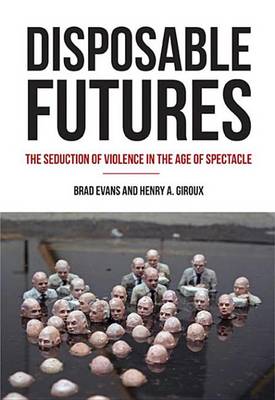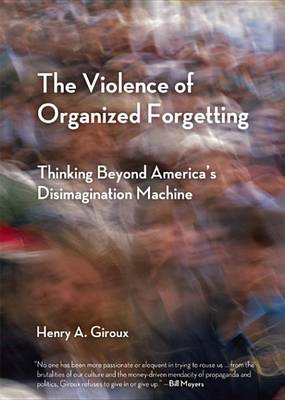City Lights Open Media
5 total works
A passionate advocate for civil rights and the importance of the imagination, Giroux argues that only through widespread social investment in democracy and education can the common good hope to prevail over the increasingly concentrated influence of extreme right-wing politicians and self-serving economic interests. Praise for America at War with Itself: "This is the book Americans need to read now. No one is better than Henry Giroux at analyzing the truly dangerous threats to our society. He punctures our delusions and offers us a compelling and enlightened vision of a better way. America at War with Itself is the best book of the year."--Bob Herbert, Distinguished Senior Fellow at Demos and former Op-Ed columnist for the New York Times "In this current era of corporate media misdirection and misinformation, America at War with Itself is a must read for all Americans, especially young people. Henry Giroux is one of the few great political voices of today, with powerful insight into the truth. Dr. Giroux is defiantly explaining, against the grain, what's REALLY going on right now, and doing so quite undeniably.
Simply put, the ideas he brings forth are a beacon that need to be seen and heard and understood in order for the world to progress."--Julian Casablancas "In America at War with Itself, Henry Giroux again proves himself one of North America's most clear-sighted radical philosophers of education, culture and politics: radical because he discards the chaff of liberal critique and cuts to the root of the ills that are withering democracy. Giroux also connects the dots of reckless greed, corporate impunity, poverty, mass incarceration, racism and the co-opting of education to crush critical thinking and promote a culture that denigrates and even criminalizes civil society and the public good. His latest work is the antidote to an alarming tide of toxic authoritarianism that threatens to engulf America. The book could not be more timely."--Olivia Ward, Toronto Star "America at War with Itself makes the case for real ideological and structural change at a time when the need and stakes could not be greater. Everyone who cares about the survival and revival of democracy needs to read this book."
--Kenneth Saltman, Professor, University of Massachusetts Dartmouth, Author of The Failure of Corporate School Reform Henry A. Giroux's most recent books include The Violence of Organized Forgetting and America's Addiction to Terrorism. A prolific writer and political commentator, he has appeared in a wide range of media, including the New York Times and Bill Moyers.
Through a series of penetrating conversations originally published in the New York Times and the Los Angeles Review of Books, Brad Evans and Natasha Lennard talk with a wide range of cutting edge thinkers--including Oliver Stone, Simon Critchley, and Elaine Scarry--to explore the problem of violence in everyday life, politics, culture, media, language, memory, and the environment. "To bring out the best of us," writes Evans, "we have to confront the worst of what humans are capable of doing to one another. In short, there is a need to confront the intolerable realities of violence in this world."
These lively, in-depth exchanges among historians, theorists, and artists offer a timely and bracing look at how the increasing expression and acceptance of violence--in all strata of society--has become a defining feature of our times.
"Many of us live today with a pervasive sense of unease, worried that our own safety is at risk, or that of our loved ones, or that of people whose bad circumstances appear to us through networked media. Violence feels ever-present. Natasha Lennard and Brad Evans help us to analyze those feelings, talking with a wide range of thinkers in order to gain insight into the worst of what humans do, and challenging us to imagine a world in which violence is no longer a given. Their book is full of surprising insights and intelligent compassion."--Sarah Leonard, co-editor of The Future We Want: Radical Ideas for the New Century
"In Violence, Brad Evans and Natasha Lennard have created, alongside their interview subjects, a kaleidoscopic exploration of the concept of violence, in terrains expected and not, in prose taut and unexpectedly gorgeous. Their philosophical rigor provides the reader with an intellectual arsenal against the violence of the current moment."--Molly Crabapple, author of Drawing Blood
"We would be wise to read this collection with a similar eye toward service, and in so doing, open ourselves up to the rare mercy of no longer having to stand on our own."--Alana Massey, author of All The Lives I Want
"The range of interviews with leading academics, to filmmakers and artists, is impressive, at once immediate and relevant, but also profoundly philosophical. More essentially, though, the conversations underline the need and suggest ways to resist and organize in a visionary way, in the extraordinary times we live in."--Razia Iqbal, BBC News
"Notable contemporary thinkers and creators give their individual perspectives in this compelling look at violence. . . . A provocative volume that challenges humanity to correct its runaway course toward an increasingly violent future by learning from its violent past."--Kirkus Reviews
"The purpose of the work is to challenge humanity to create more meaningful solutions when it comes to these kinds of violence--or at least to name violence without inadvertently inciting even more anger. . . . passion roars through every chapter . . . This book delivers on what it promises, which is an achievement. "--Alison Gately, The Los Angeles Review of Books
"If you wish to read the intellectualization of violence, Violence is a phenomenal anthology. . . . Brad Evans and Natasha Lennard, the interviewers and the 'authors' of the anthology, have done a remarkable job in bringing together perceptive and intelligent contributors from various fields to scout the reaches of violence. Their piercing questions brought out brilliant responses from the interviewees."--L. Ali Khan, New York Journal of Books
"Violence: Humans in Dark Times is an intriguing beginning to a much-needed sustained intellectual and aesthetic response to the horrors of modern times."-Zoe Vorsino
"Disposable Futures poses, and answers, the pressing question of our times: How is it that in this post-Fascist, post-Cold War era of peace and prosperity we are saddled with more war, violence, inequality and poverty than ever? The neoliberal era, Evans and Giroux brilliantly reveal, is defined by violence, by drone strikes, 'smart' bombs, militarized police, Black lives taken, prison expansion, corporatized education, surveillance, the raw violence of racism, patriarchy, starvation and want. The authors show how the neoliberal regime normalizes violence, renders its victims disposable, commodifies the spectacle of relentless violence and sells it to us as entertainment, and tries to contain cultures of resistance. If you're not afraid of the truth in these dark times, then read this book. It is a beacon of light."--Robin D. G. Kelley, author of Freedom Dreams: The Black Radical Imagination "Disposable Futures confronts a key conundrum of our times: How is it that, given the capacity and abundance of resources to address the critical needs of all, so many are having their futures radically discounted while the privileged few dramatically increase their wealth and power?
Brad Evans and Henry Giroux have written a trenchant analysis of the logic of late capitalism that has rendered it normal to dispose of any who do not service the powerful. A searing indictment of the socio-technics of destruction and the decisions of their deployability. Anyone concerned with trying to comprehend these driving dynamics of our time would be well served by taking up this compelling book."--David Theo Goldberg, author of The Threat of Race: Reflections on Racial Neoliberalism "Disposable Futures is an utterly spellbinding analysis of violence in the later 20th and early 21st centuries. It strikes me as a new breed of street-smart intellectualism moving through broad ranging theoretical influences of Adorno, Arendt, Bauman, Deleuze, Foucault, Zizek, Marcuse, and Reich. I especially appreciated a number of things, including: the discussion of representation and how it functions within a broader logics of power; the descriptions and analyses of violence mediating the social field and fracturing it through paralyzing fear and anxiety; the colonization of bodies and pleasures; and the nuanced discussion of how state violence, surveillance, and disposability connect.
Big ideas explained using a fresh straightforward voice."--Adrian Parr, author of The Wrath of Capital: Neoliberalism and Climate Change Politics Brad Evans and Henry A. Giroux are internationally renowned educators, authors, and intellectuals. Together, they curate a forum for Truthout.com that explores the theme of "Disposable Futures." Evans is director of histories of violence project at the University of Bristol, United Kingdom. Giroux holds McMaster University Chair for Scholarship in the Public Interest, and is the Paulo Freire Distinguished Scholar in Critical Pedagogy.
A far-ranging critique of the rise of authoritarianism and white nationalism in the US and the consequences for democracy.
In this searing critique of the Trump presidency and the rise of authoritarianism in the U.S., Henry Giroux asks, How have we arrived here, and what can be done? In a discussion of events that ranges from the Administration's ongoing attempts to repeal Obamacare and its anti-immigration policies and travel bans, to the normalization of a culture of cruelty and the "weaponization of ignorance," Giroux details the urgency of our current crisis.
Giroux explores the political dystopias-those of recent history and those depicted in some of the classics of Western literature-that result when authoritarian forces outmaneuver accountability. He argues that only through increased civic investment in multicultural democracy, education, and resistance can we hope to push back the ominous convergence of white nationalism and elite economic interests.
Praise for American Nightmare:
"In this current era of corporate media misdirection and misinformation . . . Henry Giroux is one of the few great political voices of today, with powerful insight into the truth. Dr. Giroux is defiantly explaining, against the grain, what's REALLY going on right now, and doing so quite undeniably. Simply put, the ideas he brings forth are a beacon that need to be seen and heard and understood in order for the world to progress."-Julian Casablancas, lead vocalist for The Strokes
"In frightening times like these, what is desperately needed is an informed and wise voice that speaks clearly and with conviction about the situation we are in, and what can be done. Henry Giroux is one of the great public intellectuals of our times, and American Nightmare is exactly the book for people grappling with how to understand the Trump era and how to proceed. This is precisely the book that needs to be shared with friends and acquaintances. It will provoke hard thinking, bring clarity, and stimulate much needed conversation and action."-Robert W. McChesney, co-author of People Get Ready: The Fight Against a Jobless Economy and a Citizenless Democracy
"We have no greater chronicler of these dystopian times. Giroux's critique cuts to the crux of today's authoritarian crisis, yet his voice remains of one hope that the people may collectively regain control. Even while living though systemic efforts to privatize hope, Giroux's critique enacts the sort of shared resistance that can effectively challenge authoritarianism. American Nightmare demonstrates how we can resist the normalization of hate, authoritarianism and alienation in Trump's America. He shows us that not only are we not alone, but we are among a majority who oppose the cruelties of American social policies."-David H. Price, author of Cold War Anthropology: The CIA and the Growth of Dual Use Anthropology
"At a moment when the news cycle presents the dangers of Trumpian authoritarianism through disjointed and discrete hottakes, Giroux's wide-reaching analysis accounts for our current American nightmare with necessary historical context, and in so doing creates an aperture for resistance more meaningful than a hashtag."-Natasha Lennard, contributing writer for The Intercept, co-editor of Violence: Humans in Dark Times
"In this passionately argued volume, Henry Giroux, long known for his critical commentaries on the de-democratization of the U.S.A., on its rising inequ(al)ity and neoliberal excesses, reflects very thoughtfully on the specter of Trump's America: on its violence, cruelty, and incivility, its burgeoning authoritarianism, its inexorable edging toward a Grave Neo World: in short, a rising specter that demands to be countered at all cost if the U.S. is to be rescued from itself."-John Comaroff, Professor of African and African American Studies and of Anthropology, Harvard University
Picking apart the current malaise of 21st-century digital disorder, Giroux describes a world in which citizenship is replaced by consumerism and the functions of engaged governance are explicitly beholden to corporations."--Publishers Weekly In a series of essays that explore the intersections of politics, popular culture, and new forms of social control in American society, Henry A. Giroux explores how state and corporate interests have coalesced to restrict civil rights, privatize what's left of public institutions, and diminish our collective capacity to participate as engaged citizens of a democracy. From the normalization of mass surveillance, lockdown drills, and a state of constant war, to corporate bailouts paired with public austerity programs that further impoverish struggling families and communities, Giroux looks to flashpoints in current events to reveal how the forces of government and business are at work to generate a culture of mass forgetfulness, obedience and conformity. In The Violence of Organized Forgetting, Giroux deconstructs the stories created to control us while championing the indomitable power of education, democracy, and hope. Henry A.
Giroux is a world-renowned educator, author and public intellectual. He currently holds the Global TV Network Chair Professorship at McMaster University in the English and Cultural Studies Department and a Distinguished Visiting Professorship at Ryerson University. The Toronto Star has named Henry Giroux "one of the twelve Canadians changing the way we think." More Praise for Henry A. Giroux's The Violence of Organized Forgetting: "I can think of no book in the last ten years as essential as this. I can think of no other writer who has so clinically dissected the crisis of modern life and so courageously offered a possibility for real material change."--John Steppling, playwright, and author of The Shaper, Dogmouth, and Sea of Cortez "A timely study if there ever was one, The Violence of Organized Forgetting is a milestone in the struggle to repossess the common sense expropriated by the American power elite to be redeployed in its plot to foil the popular resistance against rising social injustice and decay of political democracy."--Zygmunt Bauman, author of Does the Richness of the Few Benefit Us All? among other works Prophetic and eloquent, Giroux gives us, in this hard-hitting and compelling book, the dark scenario of Western crisis where ignorance has become a virtue and wealth and power the means of ruthless abuse of workers, of the minorities and of immigrants.
However, he remains optimistic in his affirmation of radical humanity, determined as he is to relate himself to a fair and caring world unblemished by anti-democratic political depravity."--Shelley Walia, Frontline




